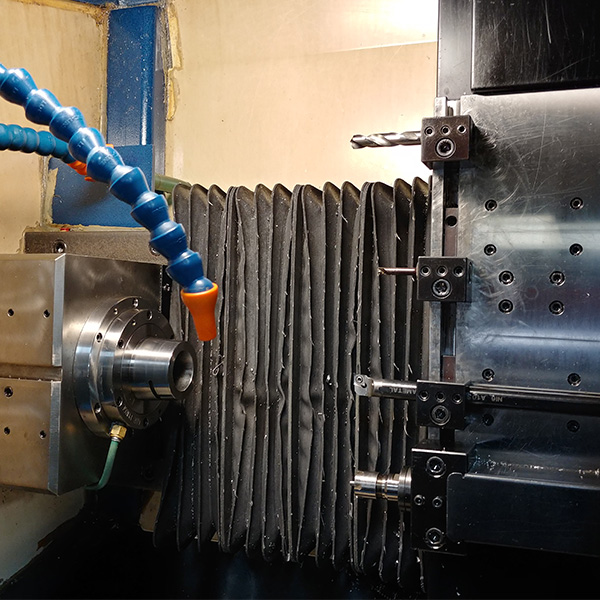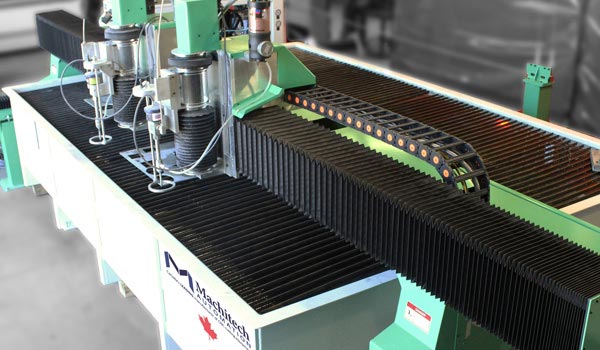See how Dynatect has revolutionized the industry for over 75 years. Dynatect Manufacturing isn’t just a bellows manufacturer; it’s a pioneer in dynamic protection solutions. Watch the video below and discover how Dynatect’s dedication to innovation has shaped the world of bellows manufacturing.
This video showcases:
- Diverse bellows applications across various industries
- A behind-the-scenes look at our diverse manufacturing processes and skilled craftspeople
A Legacy of Innovation in Bellows Manufacturing
Here are some milestones in our history focusing on bellows technology:
- 1949: Within five years of our founding, we shifted focus to providing essential protection for industrial applications like machine tools
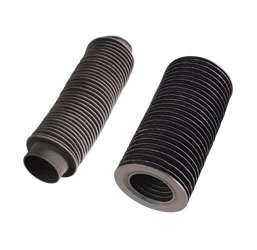
- 1973: Leveraging our bellows expertise, we entered the transportation market with articulated bus passageway bellows, later expanding to trains and monorails
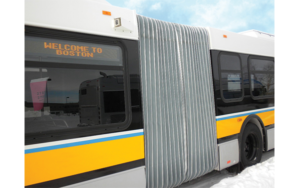
- 2002: Through the acquisition of Milwaukee Protective Covers, we gained capabilities in roll-up covers and RF-welded bellows
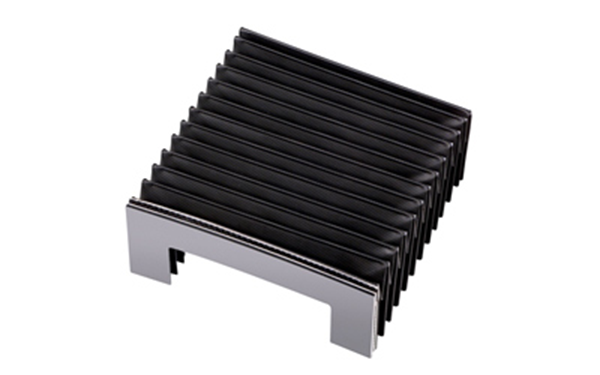
- 2013: We acquired MFB, adding to our machine tool and transportation bellows capabilities in Europe; our bellows profile was expanded to dip-molded bellows and additional design for traction motor bellows
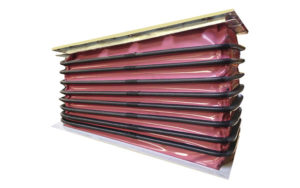
- 2015: Our expertise in large format fabric manufacturing led us to create machine roof covers, serving both machine tool and robotics & automation industries
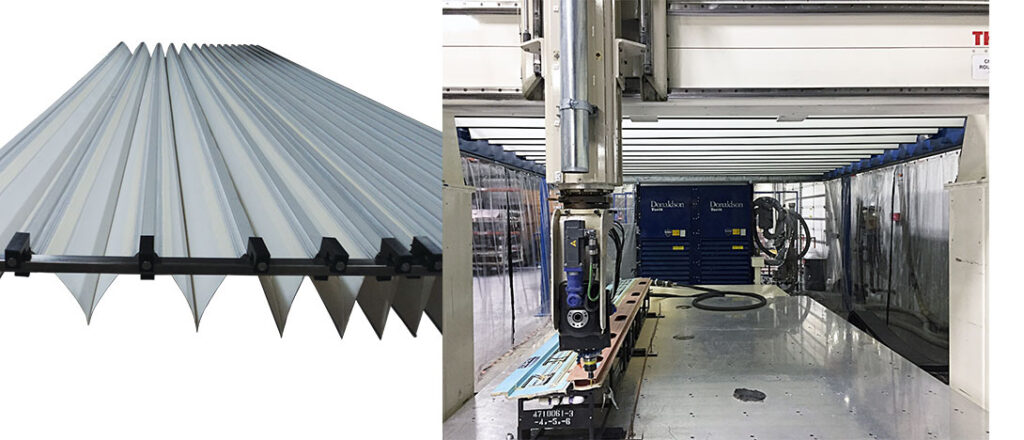
- 2016: Building on our transportation bellows knowledge, we developed mobile building bellows, offering innovative solutions for connecting cargo containers
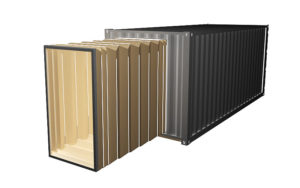
Bellows Manufacturing FAQ
What kinds of processes does Dynatect utilize in manufacturing bellows?
Dynatect leverages an extensive range of manufacturing techniques to produce high-quality fabric bellows. For elastomer components, we employ techniques like cold feed extrusion, heat processing, and press vulcanizing. We also source specialty rubbers and elastomer-coated fabrics to optimize performance for each application. Our capabilities extend to cutting elastomer, plastic, and fabric with advanced technologies like CNC blade cutting and waterjet cutting.
Metal components, such as end plates, inserts, aluminum extrusions, and shields, are precisely cut using shear, punch, plasma, waterjet, and laser technologies.
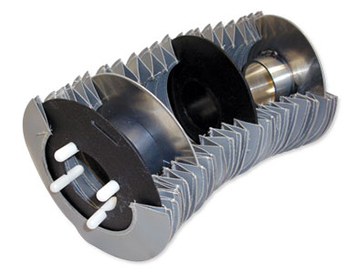
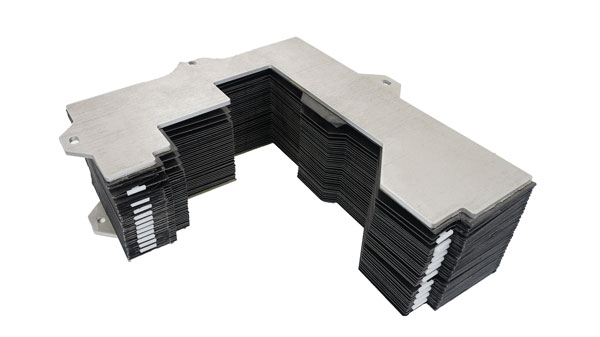
Once individual components are manufactured, we utilize a variety of assembly techniques including sewing, pleating, shaping, and bonding. Finally, Dynatect’s testing capabilities include cycle testing, multi-axis functionality, thermal and chemical resistance, pressure integrity, and air/water tightness.
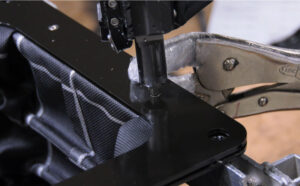

What types of bellows does Dynatect manufacture?
Dynatect has the widest selection of manufacturing capabilities including folded, sewn, molded, sewn-folded, heat sealed, and vulcanized. This variety of solutions can be designed to maximize application motion and aesthetics.
- Folded: Constructed out of multiple layers of elastomer or thermoplastic materials, folded to the final shape
- Gorframe™: Fabricated from a sheet of material attached to a wire frame support structure
- Gortiflex®: Constructed from a tube of elastomer or elastomer-coated fabric formed into a sealed cover
- Gordillo™: a Sewn-Folded or Heat Sealed way cover made with stainless steel plates covering each convolution. The plates shield the bellows from conditions that damage a conventional bellows
- Heat-Sealed: Manufactured from a single sheet of thermoplastic-coated fabric, which is pleated and then thermally welded to a PVC stiffener at every fold
- Liftgard®: Constructed of aluminum extrusions shaped to provide structure and strength to folded PVC/ nylon. Standard design includes zipper and corner venting to accommodate rapidly rising and descending lifts
- Sewn: Made from heavy-duty elastomer-coated fabric stitched with nylon or specialty thread
- Sewn-Folded: Manufactured from a single sheet of thermoplastic-coated or elastomer-coated fabric, which is pleated and then sewn to a PVC stiffener at every fold
- Thermiseal: Made from polyurethane films or polyurethane-coated fabrics bonded together by thermic weld process
- Vulca-Seal®: Made from separate sections of material joined by vulcanizing alternating seams to form convolutions
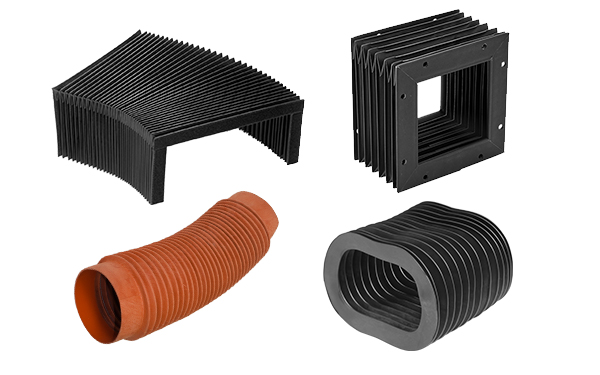
What are some materials Dynatect uses in the production of bellows?
Dynatect utilizes a wide range of materials to cater to the diverse application needs of bellows:
- Common materials: Fabric-reinforced elastomers (most common), elastomers (nitrile, chloroprene, etc.), fabric-reinforced thermoplastics, thermoplastic elastomers, ballistic nylon, PTFE, aluminized fabrics, PVC plastisol.
- Fabric-Reinforced Elastomers: Dynatect offers elastomer-coated fabrics with various rubbers like butyl, chloroprene, CSM, EPDM, FKM, nitrile, polyurethane, silicone, and SBR. Common fabric reinforcements include nylon, polyester, para-aramids, and fiberglass.
- Specialty Applications: Dynatect has materials for medical (microbial, cleaning, FR), FDA compliance, flame retardancy, specific regulations, chemical exposure, cleanroom/lab environments, extreme heat/lasers, and outdoor use.
- Material Selection Considerations: Dynatect offers materials with specific properties like:
- Outdoor/UV Resistance: Goralon®/CSM fabrics, chloroprene fabrics, military-spec materials.
- Fluid Resistance: PTFE (harsh chemicals), Goralon®/CSM (acids), nitrile (hydrocarbon oils). Consult Dynatect for specific chemical needs.
- Abrasion Resistance: Ballistic nylon, Goralon®/CSM fabrics, polyurethane fabrics.
- Heat/Spark Resistance: Silicone coated fiberglass, aluminized fiberglass, PTFE, FKM, EPDM, CSM (limited temperature).
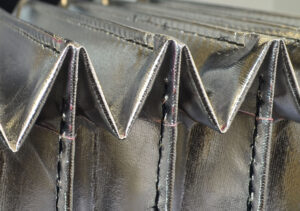
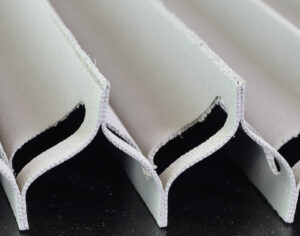
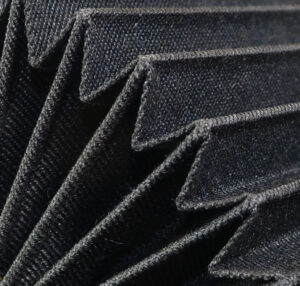
What is unique about Dynatect as a bellows manufacturer?
Dynatect sets itself apart from the competition in several key ways. Unlike many bellows suppliers who primarily focus on fast, low-cost production, Dynatect prioritizes both quality and customization. We offer the industry’s widest variety of manufacturing processes and materials, allowing us to tailor solutions to specific customer needs. This flexibility is particularly valuable for applications requiring tight tolerances, high aesthetics, or extreme performance.
Notably, Dynatect is equipped to handle “extreme” bellows – the longest, fastest, or widest – that might push the boundaries of what other manufacturers can produce.
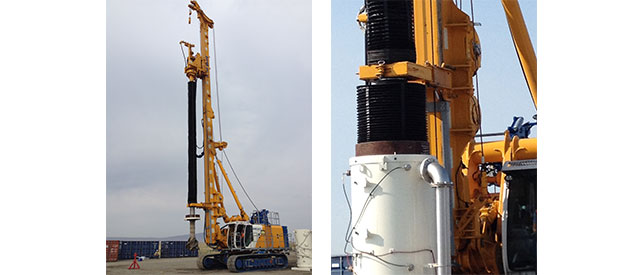
Additionally, Dynatect is prepared to grow alongside their customers. We can accommodate orders of any size, ensuring a continued, reliable source of high-quality bellows as a customer’s market adoption expands.
How does Dynatect aim to deliver high-quality, high-performing bellows for various applications?
 At Dynatect, our commitment to high-quality, high-performing bellows extends beyond the manufacturing floor. We believe the key lies in collaboration. We work closely with our customers to gain a deep understanding of their specific needs and challenges. This collaborative approach facilitates an environment for exploring innovative solutions that might not have been previously considered. Together, we can push the boundaries and potentially even discover solutions that exceed initial expectations.
At Dynatect, our commitment to high-quality, high-performing bellows extends beyond the manufacturing floor. We believe the key lies in collaboration. We work closely with our customers to gain a deep understanding of their specific needs and challenges. This collaborative approach facilitates an environment for exploring innovative solutions that might not have been previously considered. Together, we can push the boundaries and potentially even discover solutions that exceed initial expectations.
Our commitment to your success extends beyond the design phase. With over 50 local manufacturer’s representatives strategically located across North America, you receive expert service and consultation wherever you are. Our representatives have a deep understanding of our products and your local market, ensuring you receive the support you need to succeed.
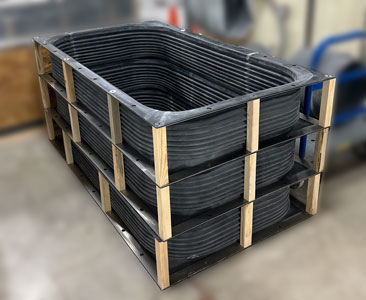
What is the impact of bellows quality on machinery performance?
Bellows are crucial components in various machines, protecting components responsible for motion control. However, their quality directly impacts machinery performance and reliability. Poorly designed bellows lead to frequent downtime, compromised machine performance and installation challenges due to short lifespan, and limited functionality. Custom bellows, on the other hand, are designed to precisely fit existing equipment, utilizing materials specifically chosen to withstand the operating environment. For example, custom bellows might be designed with superior temperature resistance for high-heat applications or enhanced chemical compatibility for exposure to specific fluids. By selecting high-quality bellows, engineers can significantly contribute to the smooth and reliable operation of their machinery and motion control systems.
